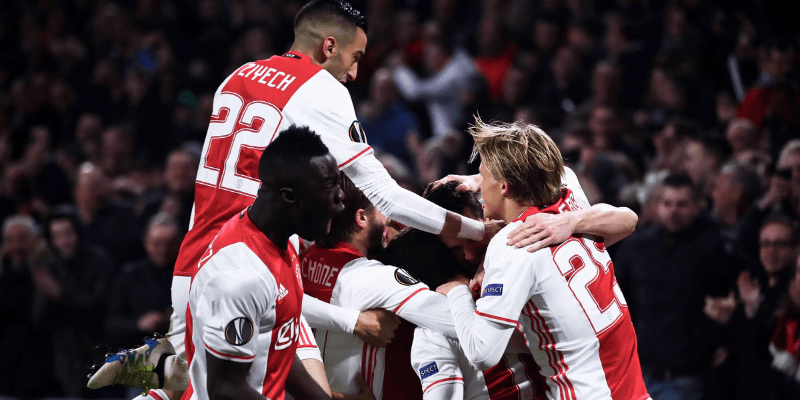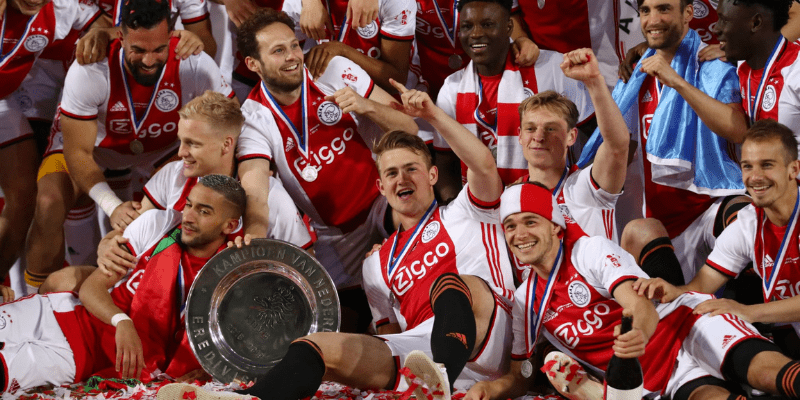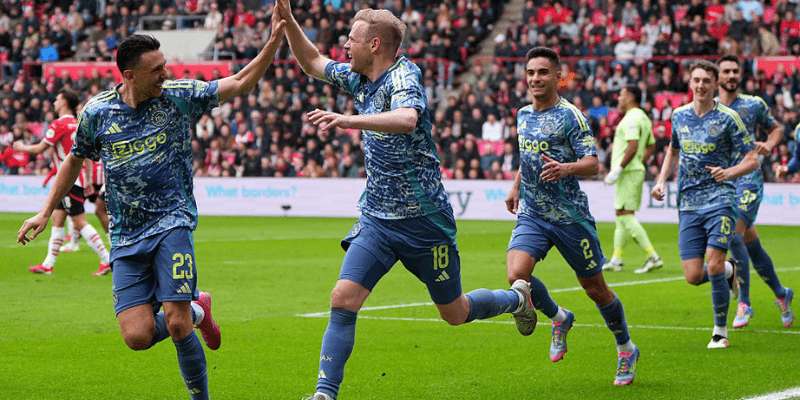One season stands in Ajax’s history as the Everest — the moment when club, players, and philosophy all reached their apex. In this article, DuitKick will walk you through why Ajax’s most successful season is widely considered to be 1971–72, with strong arguments also for 1994–95, examining trophies, records, context, and lasting impact.
The criteria that define a “most successful season”

Before we name the champion, we must clarify what we mean by “most successful.” For football fans and historians, the benchmark often includes:
- Number (and prestige) of trophies won
- Undefeated or dominant performance
- Impact at home and in Europe
- Legacy and innovation introduced
Applying those criteria, two Ajax seasons immediately rise above the rest: 1971–72 and 1994–95. Let’s examine both in depth.
The 1971–72 season: Total Football’s crowning glory
Treble, dominance, and innovation
- In 1971–72, Ajax captured the Eredivisie, the KNVB Cup, and the European Cup — the continental treble. This remains one of the club’s—and Europe’s—most iconic seasons.
- That season Ajax also lost only once across all competitions, showing resilience and consistency.
- The squad, managed by Stefan Kovács, featured Johan Cruyff as the phenom, supported by a system rooted in Johan Cruyff’s and Rinus Michels’ “Total Football” thinking. The season became a manifestation of that football identity.
Records and highlights
- In the domestic league, Ajax was almost untouchable. Home and away, they dominated.
- In Europe, they defeated Internazionale 2–0 in the final, securing continental supremacy.
- That season is often cited in histories of Ajax’s golden era, as the moment when the club’s playing philosophy and prestige intersected perfectly.
Because they won the treble, lost only a single match, and embodied a lasting style, 1971–72 is often considered Ajax’s definitive “most successful season.”
The 1994–95 season: The invincible European triumph
As time passed, another season began to rival 1971–72 in lore and admiration.
Unbeaten league run + Champions League glory
- Under Louis van Gaal, Ajax went unbeaten in the Eredivisie, scoring 106 goals, and clinched the domestic title.
- In Europe, Ajax won the UEFA Champions League, defeating AC Milan in the final, with a solid campaign in which they never lost a match in European competition either.
- The domestic double (league + European Cup) was impressive — though Ajax did not win the Dutch cup that year, their invincibility and peak European form make this season legendary.
Why 1994–95 competes
- The level of difficulty in European competition had grown, and Ajax’s undefeated run in both domestic and continental matches suggests supreme balance and resilience.
- That triumph in the Champions League ended a decades-long wait, and reasserted Ajax’s place among Europe’s elite.
- The squad included rising stars such as Patrick Kluivert and Jari Litmanen, and it is fondly remembered as one of Ajax’s modern classics.
Head-to-head: weighing the two seasons

Let’s compare side by side:
| Metric | 1971–72 | 1994–95 |
| Trophies | 3 (League, Cup, European Cup) | 2 (League, European Cup) |
| Treble achieved? | ✅ | ❌ (missed the domestic cup) |
| Losses | 1 overall in all competitions | 0 in league, few in cups (but not treble) |
| European performance | Won European Cup; dominant campaign | Won Champions League; undefeated in Europe |
| Legacy & innovation | Crucial for “Total Football,” high symbolism | Modern era resurgence, revival of Ajax in Europe |
If your bar is “treble + dominance,” 1971–72 has the edge. If your bar is “unbeaten league + European crown in a modern era,” 1994–95 stands tall.
Why many pick 1971–72 as Ajax’s most successful season
- No other Ajax season delivered the treble — that rare feat cements it in club folklore.
- Ajax’s playing identity, built on Total Football, was in full bloom, and the season served as the playbook for future generations.
- The rarity of combining domestic and continental dominance in that era magnifies its weight.
Yet, Ajax fans often debate — could 1994–95 surpass it under modern metrics? A valid argument exists. But history tends to favor the season where art, identity, and triumph merged — that’s 1971–72.
Other seasons worth noticing

While 1971–72 and 1994–95 dominate the discussion, some other seasons deserve mention:
- 1972–73: Ajax won the European Cup again (their third in a row). But domestically the season wasn’t a trebler; the cup wasn’t added.
- Many strong domestic seasons, such as 2018–19 (league + cup + deep run in the Champions League, semifinal) are special, but they don’t match the total package of those two peaks.
Why the debate continues — and why it’s healthy
Football fans love debates because comparing across eras is never perfect. Differences in competition depth, formats, financial context, and style all influence how “greatness” is judged. The fact that Ajax’s most successful season invites two strong contenders shows the richness of the club’s legacy.
If people ask you, “Which is Ajax’s greatest season?” you have a strong argument to present — and you might even argue for both, depending on your preferred metrics.
Final Thoughts
Ajax most successful season is most often pointed to 1971–72, thanks to the rare treble, near-invincibility, and embodiment of Total Football. But 1994–95 stakes a compelling claim too, especially for modern fans who value undefeated runs and European mastery.
DuitKick hopes this journey through Ajax’s peaks helps you appreciate how greatness is shaped. If you’re curious about detailed stats, player breakdowns, or comparisons across eras, let us know — we’ll dig dee






